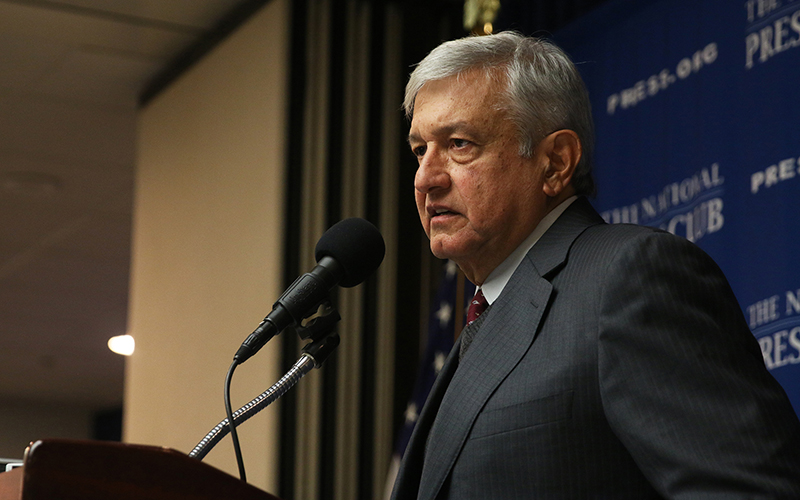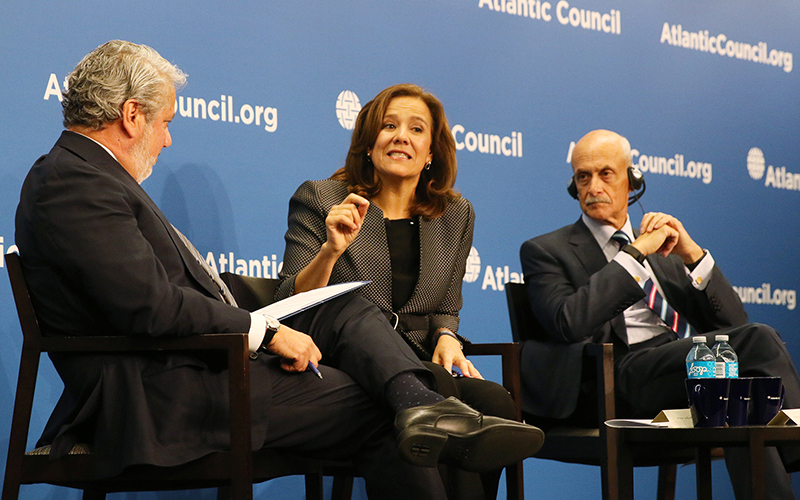
Andres Manuel Lopez Obrador, considered a leading candidate for Mexican president, filed a petition with the Inter-American Commission on Human Rights against President Donald Trump’s characterization of and policies toward Mexican immigrants. (Photo by Andres Guerra Luz/Cronkite News)

Margarita Zavala, a challenger to Obrador, was in Washington for meetings last week, includings meetings with Arizona’s senators. Zavala, like opponent Andres Miguel Lopez Obrador, said she hopes for good U.S. relations despite concerns about Trump. (Photo by Andres Guerra Luz/Cronkite News)
WASHINGTON – A leading candidate for the Mexican presidency filed a petition Wednesday in Washington that calls on President Donald Trump’s administration to stop its “racist, discriminatory speech” and “massive” deportation aimed at Mexican migrants.
Andres Manuel Lopez Obrador, the populist leader of the National Regeneration Movement in Mexico, made the comments as part of a speech at the National Press Club about the petition and the future of NAFTA under the Trump administration, among other issues. Obrador made the statements Wednesday, prior to a federal judge’s decision to block Trump’s latest travel ban.
The petition, presented to the Inter-America Commission on Human Rights, accused the administration of issuing policies that violate human rights laws and the U.S. Constitution.
The White House did not immediately return a request for comment on Obrador’s charges Wednesday.
Obrador’s visit comes a week after a visit to Washington by another Mexican presidential hopeful, Margarita Zavala. While here, she met with Arizona Sens. John McCain and Jeff Flake to discuss topics such as trade between the state and Mexico.
While both Obrador and Zavala denounced Trump’s treatment of Mexican immigrants in the U.S., they both expressed a desire to maintain the close U.S.-Mexico relationship both countries have enjoyed in recent years, especially in trade.
Zavala said hateful rhetoric towards Mexican immigrants will make it more likely that Mexican voters will support a president who pushes back against foreign ties and who doesn’t approach trade as openly as previous Mexican presidents have in the past.
-Cronkite News video by Marisela Ramirez
In a piece she wrote for the Washington Post, Zavala said the U.S. is more prosperous as a result of its ties with Mexico, but Mexicans will not accept cruel policies targeted at their communities.
The latest economic indicators from the University of Arizona’s Eller Institute show that $2.3 billion of goods flow to Mexico through Arizona’s border port of entry and the state exports $667 million a month to Mexico.
“We would rather tend bridges than build walls. But our alliance must be based on mutual respect,” Zavala’s article said. “We will not accept a relationship based on threats and insults, contempt for our country and cruelty toward our citizens.”
Obrador, speaking through an interpreter, said in his speech that it would not be easy to cut trade ties between Mexico and the U.S., because their economies are so “interrelated.”
“Both countries need each other in order to be competitive,” Obrador said.
Obrador said the U.S. and Mexico should not rush into trade renegotiations, as “politics should move slowly in order to do it right.”
But Obrador’s hopes for close economic ties between the two countries has not silenced his opposition to the new administration.
He said Wednesday that Trump’s “campaign of hate” is “unjust and inhumane,” and that the U.S. president’s position on migrants is “excessive.”
The petition he presented to the Inter-American Commission on Wednesday demanded that the administration respect four rights for Mexican migrants in this country: the right to not be discriminated against, the right of children not to be separated from their families, the right to due process and the right to private property, salary and labor.
“Beyond borders, it’s important to defend human rights,” Obrador said.
The commission can make recommendations on U.S. policy but it does not have the same level of authority as the United Nations, Obrador said. Because he is only a candidate and not a government official, Obrador said he could not approach the UN – but he might if elected.